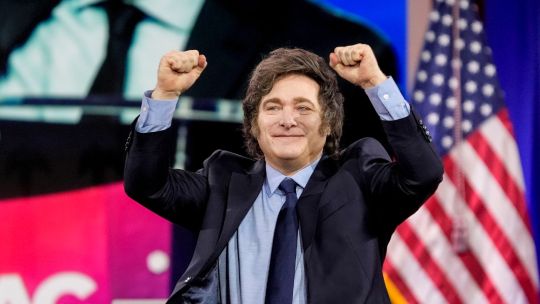
President Javier Milei finally has his trade deal with Donald Trump, but the libertarian leader’s political victory also represents a challenge to open up Argentina’s protectionist economy.
Washington rolled out the framework for an agreement with the crisis-prone South American nation on Thursday, after Milei made more than a dozen trips to the US in two years. The pact adds to the Trump administration’s tens of billions of dollars in financial support for its ideological ally and delivers on the Argentine president’s promise to voters to secure such a deal.
“This trade agreement shows the United States remains engaged in Argentina and invested in Milei’s success but it won’t solve the most daunting challenges he faces,” said Benjamin Gedan, director of the Latin America programme at the Washington-based Stimson Center. “Argentina has been one of the most closed markets in the world for so long that many of its industries simply can’t compete.”
The deal, which US officials say could be signed within about two weeks, builds on Milei’s political momentum after his party won Argentina’s midterm elections in a resounding comeback, spurring a market rally and renewing investor optimism for big economic reforms given he’ll have more seats in Congress by December.
Earlier this year, Argentines expressed support for a US trade pact, according to AtlasIntel polling for Bloomberg News. Yet respondents weren’t convinced local industries could compete with US manufacturers.
Republicans in the US also criticised the Trump administration’s attempts to increase trade between the two countries on soy and beef. The agreement’s framework says Argentina will import live cattle from the US and open up its poultry market to American producers within a year.
The South American nation often ranks among the worst worldwide on trade barriers, given its tariffs averaged 13 percent in recent years compared to 3.5 percent in the US, according to World Bank data. Argentina’s last attempt at opening up its economy in the 1990s crushed local manufacturing and made free trade synonymous with job losses among many voters.
“The deal tilts in Washington’s favour. This makes sense. Argentina recently received US support in the form of a US$20-billion swap and direct interventions from the US Treasury in the peso market during a more difficult period. The cash-strapped economy also benefits from the deal’s signalling effect, which may prove more relevant for its macroeconomic outlook than the trade measures themselves,” said Jimena Zúñiga, Bloomberg’s Argentina economist.
Even with the deal’s full size and scope still to be finalised, it stands to be limited by Argentina’s membership in South American trade bloc Mercosur, which prohibits countries from making sweeping agreements with other nations. Earlier this year, Mercosur agreed to let its members select 50 products to negotiate with non-member nations that wouldn’t be subject to the bloc’s tariffs.
The framework of Argentina’s deal also points to more economic benefits for the US, potentially signalling the trade-off Milei had to make to secure a US$20-billion currency swap line during a pre-election run on Argentina’s currency.
Argentina committed to providing US exports preferential market access on certain cars, medicines, chemicals, machinery, tech products, medical devices and “a wide range of agricultural products,” according to the White House statement Thursday. Argentina has a major auto industry and a highly protected electronics sector, raising questions about what the deal means for local business.
Among other aspects, “the United States will remove the reciprocal tariffs on certain unavailable natural resources and non-patented articles for use in pharmaceutical applications.”
Until the details become clearer, Milei is enjoying a victory lap having travelled 14 times to the US since taking office. He was criticised locally after coming home empty-handed from some trips earlier this year, despite hopes for big meetings or major investment announcements.
“It seems the trips produced a little bit,” Milei said sarcastically during a speech Thursday night. “We’re deeply committed to making Argentina great again.”
by Patrick Gillespie, Bloomberg





